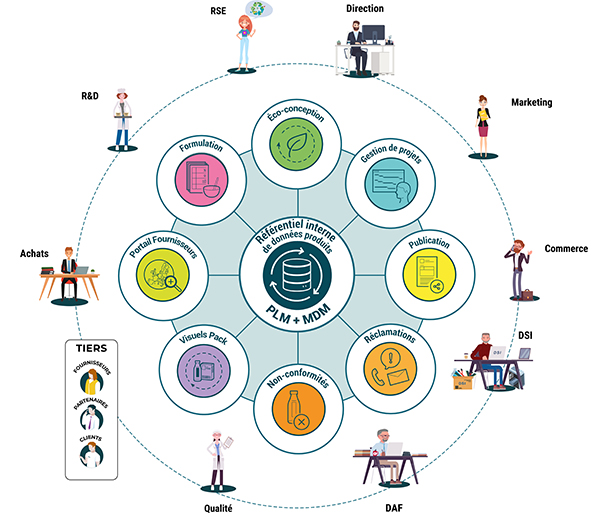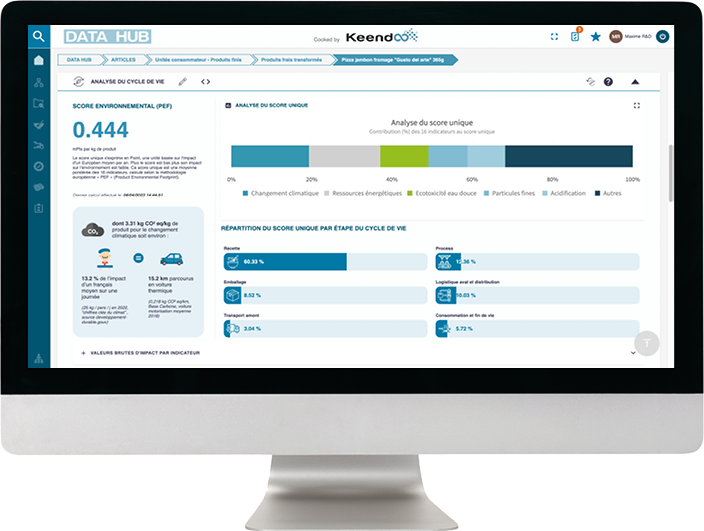Product data: Keendoo puts its expertise at the service of the food industry to structure, make reliable, keep up to date and distribute data to all information systems, both internal and external.
Constantly changing regulatory frameworks, new demands from distributors, consumer expectations: manufacturers have an ever-increasing amount of data to manage and distribute, to other information systems, to their customers and to consumers. The more data accumulates, the less easy it is to master... Ensuring the reliability and consistency of product data has become a strategic issue for the food industry in just a few years.
Product data reliability: what's at stake for the food industry?
On the one hand, information for consumers seeking transparency. Expectations in this area vary from one consumer to another (origin of raw materials, presence of allergens, nutritional values and Nutri-score®, avoidance of components, production methods, environmental impact, labels: the list is long). Food manufacturers need to be able to maintain and supply reliable, consistent information on all distribution media: in-store (packaging), applications (Open Food Fact®, Yuja®, Y a quoi dedans®, Innit®, etc.), drives increasingly linked to these consumer applications.
"Consumers are increasingly demanding guarantees on the products they buy, and the agri-food industries need to innovate to answer these questions."
Panorama of IAA 2022
All these criteria can influence purchasing decisions, especially within the same product category. Different information for the same product can confuse consumers and undermine their confidence.
Product data: what are we talking about in the food industry?
Product reference, EAN, composition, origin of raw materials, allergens, Nutri-score®, nutritional values, labels, environmental display, microbiological and physico-chemical characteristics, shelf life, storage method, CU dimensions, recyclability and sorting instructions for packaging, etc.: over 1,000 pieces of information characterize a food product. R&D, purchasing, quality, marketing, production, sales: all departments are involved. And each one holds, enriches and updates part of this data. It's everywhere in the agri-food company: in files, folders, spreadsheets, e-mails, on servers, in computers... Which data is the right one? Is it reliable? Up to date? Scattered and sometimes duplicated in this way, ensuring the reliability and uniqueness of product data is becoming increasingly difficult for companies.
Product data management: the Keendoo experience
With the advent of e-commerce and the multiplication of information vectors, mastery of product data is becoming strategic for agri-food companies. Relying on expertise saves precious time when it comes to implementing appropriate software solutions.
This is Keendoo's business. Specializing in product data for the food industry, Keendoo's agri-food and IT engineers have built up a wealth of experience through numerous customer projects in a variety of sectors and sizes (Eurial, Panzani, Materne-Montblanc, Sodebo, Euralis, Sodiaal, Lustucru frais, Thiriet, Systeme U...). They support customers in structuring, managing and updating their data with the Keendoo software suite.
Software solutions tailored to the specific needs of the food industry
The Keendoo software suite is based on a company-internal product data repository. In this centralized database, all the data characterizing products and their components is structured, secured and kept up to date by the contribution of all the departments involved in product innovation and modification: characteristics of raw materials (origin, labels, allergens, etc.), packaging (materials, recyclability, food suitability), recipes and their previous versions, finished product, logistics cluster, GS1 data, etc.
And it's made up of functional modules, dedicated to each department, linked together by this shared database. In this way, data generated by one department is available to the others: no more multiple copies, no more e-mail exchanges... Each piece of data is unique, versioned as modifications are made and validated by formal validation circuits via workflows.
To avoid time-consuming and error-prone re-keying, product information is kept up to date and verified, so it can be transmitted to other information systems, both internally (e.g. ERP) and externally (e.g. GDNS GS1 electronic catalogs or e-commerce sites).

Environmental labelling: new data to master
Like the Nutri-score® for nutritional values, environmental labelling aims to provide consumers with simplified information on a product's environmental impact, with a view to influencing their choices within the same product category. As a result, this new display becomes a lever for differentiation when the company masters the data required for its calculation, limiting the use of average data from reference databases such as Agribalyse®.
To calculate this new score, upstream impact data (agricultural production and first transformations) are added for raw materials. Consolidated in the reference database, the new Eco-design module makes it easy to assess the environmental impact of products in real time, based on Life Cycle Assessment (LCA), the official methodological framework supported by ADEME.
The specific LCA score obtained is the key to an environmental display as close to reality as possible. By visualizing the impact indicators it contains, you can identify levers for action to reduce your impact through eco-design initiatives. Combining this new module with the others, notably the Formulation module, speeds up and industrializes these processes.

Mastering your product data with Keendoo: what are the benefits for your company?
Food products are constantly evolving to meet market demands: new regulatory, commercial and consumer requirements. As the Panorama de IAA 2022 points out, "innovation is a key driver of business competitiveness". Implementing an internal product data repository combined with PLM saves time, streamlines the product innovation-renovation process and reduces time-to-market. The company becomes more reactive to adapt to its markets. "Companies' mastery of data is the key to maintaining their position in certain markets, and even to gaining a competitive edge through the innovative use they will be able to make of it."according to Panorama des IAA 2022
When you choose Keendoo, you choose software solutions specifically designed for the food industry, which evolve with its particular needs.

